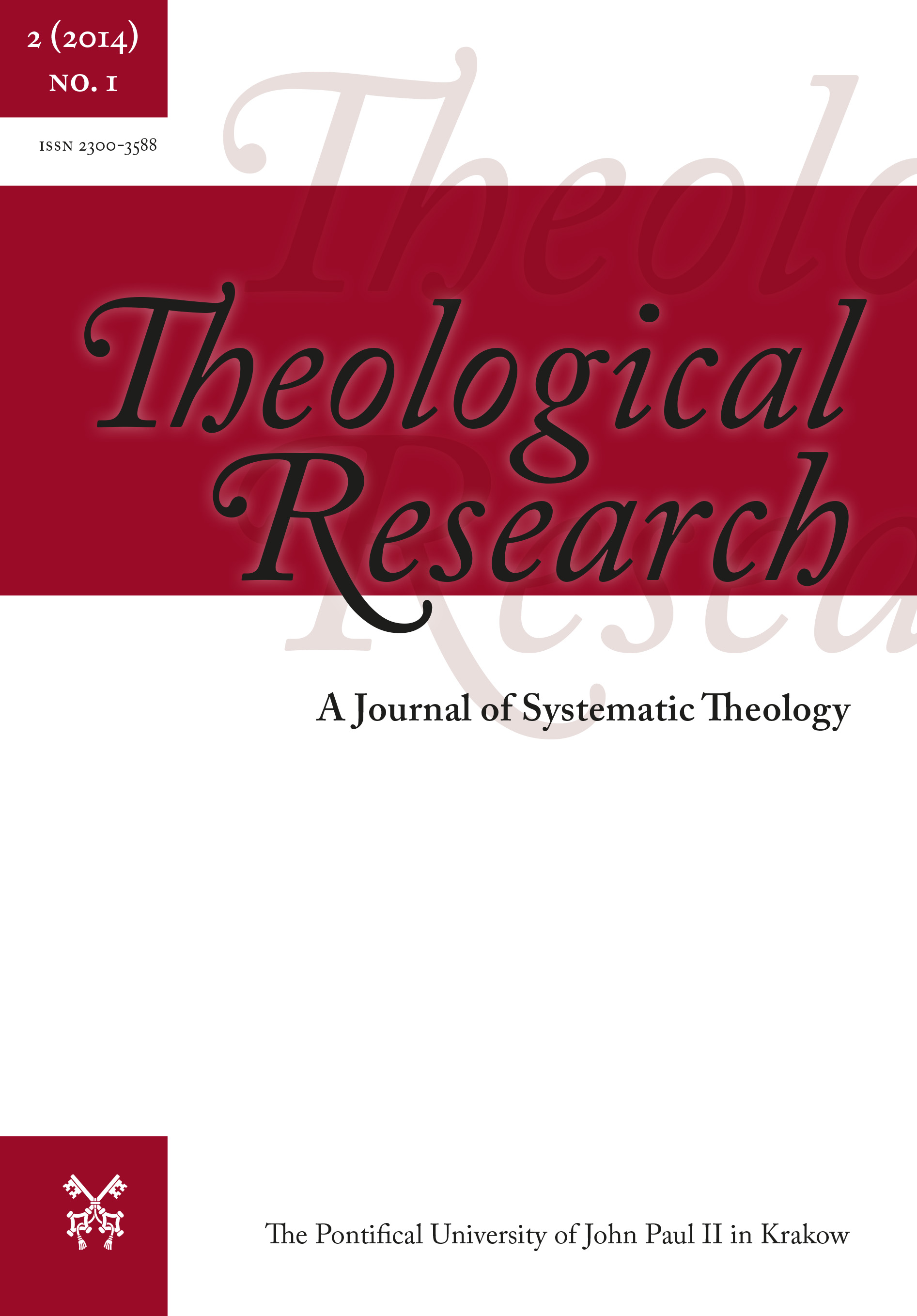Life as Relatio: Classical Metaphysics and Trinitarian Ontology
DOI:
https://doi.org/10.15633/thr.677Słowa kluczowe:
Gregory of Nyssa, Augustine, Thomas Aquinas, metaphysics and trinitarian theologyAbstrakt
Life is a theological and metaphysical problem, because it constitutes the apex of the realm of being. The Aristotelian Unmoved Mover was identified with Life as the act of thinking. Christian doctrine affirms that God is triune just as Life, but here identified both with Logos and Love. The ontology of the First Principle is different in Classical metaphysics and in Trinitarian theology. The question discussed in the paper is how this difference affects the understanding of the relationship between God and the world. Having recourse to the theological framework developed by the Cappadocian Fathers in the discussions that lead to the formulation of the Trinitarian dogma in the 4th century, free and mutual relation is presented as the key concept that was used in theology to overcome the limitations of the metaphysics of the time and to extend it in order to develop a new ontology that is an ontology of life. Trinitarian ontology may also aid our understanding of created life, because it is not simply meta-physics, i.e. a description of man and God according to the category of necessity, but is ana-physics: life is understood from above with suitable categories for free beings.
Bibliografia
Aristotle, Metaphysics.
Augustine, The Trinity.
Ayres L., (Mis)Adventures in Trinitarian Ontologies, in: J. Polkinghorne (ed.), The Trinity and an Entangled World, Cambridge 2010, pp. 130–145.
Bausola A., La libertà, Brescia 1990.
Berti E., “Per i viventi l’essere è il vivere” (Aristotle, De anima 415.b.13), in: M. Sánchez Sorondo (ed.), La vita, Roma 1998, p. 29.
Berti E., Attualità dell’eredità di Aristotele, PATH 5 (2006) p. 302–305.
Daniélou J., Dieu et nous, Paris 1956.
Donati P., Relational Sociology. A New Paradigm for the Social Sciences, London–New York 2011.
Gregory of Nyssa, Contra Eunomium.
Lafont G., Peut-on connaitre Dieu en Jésus-Christ?, Paris 1969.
Maspero G., Patristic Trinitarian Ontology, in: G. Maspero, R. J. Wozniak (eds.), Rethinking Trinitarian Theology: Disputed Questions And Contemporary Issues in Trinitarian Theology, London–New York 2011.
Maspero G., Remarks on the Relevance of Gregory of Nyssa’s Trinitarian Doctrine for the Epistemological Perspective of 20th Century Psychoanalysis, European Journal of Science and Theology 6 (2010) p. 17–31.
Musso P., Science and the Idea of Reason, Milano–Udine 2011.
Plato, Laws.
Plato, Sofist.
Plato, Symposium.
Ratzinger J., Introduction to Christianity, San Francisco 2004.
Reale G., Metafisica di Aristotele, Milano 2004.
Ruiz Aldaz J.I., article Contra Eunomium III, in: L. F. Mateo-Seco, G. Maspero (eds.), The Brill Dictionary of Gregory of Nyssa, Leuven 2010, pp. 307–310.
Thomas Aquinas, Disputed Questions Concerning Divine Power.
Zizioulas J., Trinitarian Freedom: is God Free in Trinitarian Life?, in: G. Maspero, R. J. Wozniak (eds.), Rethinking Trinitarian Theology: Disputed Questions And Contemporary Issues in Trinitarian Theology, London–New York 2011.
Pobrania
Opublikowane
Numer
Dział
Licencja
Autrzy publikujący w czasopiśmie "Theological Research" zgadzają się na następujące zasady:
a. Autorzy przenoszą na rzecz Uniwersytetu Jana Pawła II w Krakowie (UPJPII) autorskie prawa majątkowe do swoich tekstów.
b. UPJPII udostępnia teksty na platformie wydawniczej, na licencji Creative Commons Uznanie autorstwa-Użycie niekomercyjne-Bez utworów zależnych 3.0 Polska, która umożliwia ich pobieranie i udostępnianie (np. w repozytoriach naukowych), o ile zostaną spełnione warunki:
- podany autor i tytuł tekstu,
- podane miejsce publikacji (tytuł czasopisma i adres internetowy do oryginalnie opublikowanego tekstu),
- tekst będzie dystrybuowany w sposób niekomercyjny.

